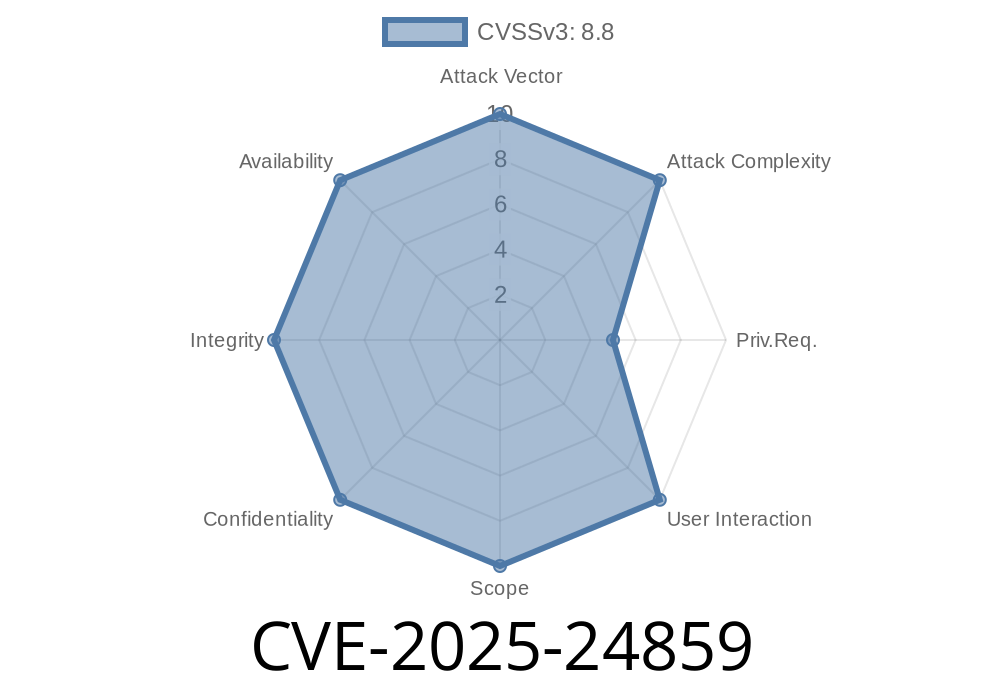A new security vulnerability has been found in the Apache Roller blog server, tracked as CVE-2025-24859. Before version 6.1.5, Roller failed to invalidate existing user sessions when a password is changed—by the user or an admin. This means that if someone’s password is updated after their session was hijacked, the attacker could still access the account through previously active sessions.
In this post, I’ll break down how this issue works, what’s at risk, show example code, and point you to references and fixes.
What is Apache Roller?
Apache Roller is an open-source, Java-based weblog server. It lets users create and manage blogs on their own server and is popular with institutions and companies who want open-source control over their blogging platform.
About CVE-2025-24859
Vulnerability summary:
All Apache Roller versions up to and including 6.1.4 do not invalidate a user’s existing sessions when their password is changed. This creates a security gap. If someone's session is compromised (for example, via session theft or a leaked session ID), that unauthorized user could keep accessing the account even after the password was changed.
Fixed in:
Apache Roller 6.1.5 (Release notes)
Exploit Scenario – How attackers could abuse this
Let’s say Alice’s Roller account session is stolen by Mallory. At some point, Alice (or an admin) realizes suspicious activity and changes Alice’s password.
With this vulnerability:
Mallory’s old session is still valid.
- Mallory can usually keep accessing Alice’s blog as admin, making changes, or stealing information until the session naturally expires (which could be days or even weeks).
1. Session Hijack (setup)
Suppose an attacker has acquired Alice’s session ID (maybe by XSS, malware, or sniffing).
Cookie: JSESSIONID=abcdef123456789
2. Password Change
Alice realizes her account's been tampered with. She changes her password immediately, believing this will log out any imposters.
Meanwhile, the attacker simply uses the stolen session cookie
POST /roller-ui/profile.do HTTP/1.1
Host: blog.example.com
Cookie: JSESSIONID=abcdef123456789
Content-Type: application/x-www-form-urlencoded
action=updateProfile&newBlogTitle=Hacked
Impact: The request goes through! The session hasn’t been invalidated, and the attacker retains access, even with a new password in place.
Why Did This Happen? (Technical explanation)
Prior to 6.1.5, *Roller’s logic for password change only updates the user’s credentials in the database.* There is no code that checks or terminates all existing sessions for that user.
Here’s a pseudocode snippet that illustrates the flawed workflow
// Old password update logic in Apache Roller
public void changePassword(String username, String newPassword) {
User user = userRepository.find(username);
user.setPassword(hash(newPassword));
userRepository.save(user);
// MISSING: sessionManager.invalidateAllSessionsForUser(username);
// Existing sessions remain active!
}
The Fix in 6.1.5
Starting from Apache Roller 6.1.5, a new mechanism is added to invalidate all sessions tied to a user when:
Their account is disabled.
How:
There's now a centralized session management component. When the password changes, it loops through existing sessions and forces a logout.
Here’s what the (simplified) logic now looks like
public void changePassword(String username, String newPassword) {
User user = userRepository.find(username);
user.setPassword(hash(newPassword));
userRepository.save(user);
sessionManager.invalidateAllSessionsForUser(username); // Added!
}
This ensures the attacker can’t keep going with the old session after a password update.
References & Original Sources
- CVE Record: CVE-2025-24859
- Apache Roller Security Page
- 6.1.5 Release Notes & Source
- Best Practices: Session Invalidation after Password Change (OWASP)
Upgrade to Apache Roller 6.1.5 or later.
- If you run any version ≤ 6.1.4, sessions will NOT be invalidated on password change, leaving you at risk.
Conclusion
CVE-2025-24859 is a simple but significant flaw in Apache Roller session security—allowing hackers to retain access through leftover sessions. The fix is straightforward (invalidate on password change), but it’s crucial to update, especially if your Roller instance is public-facing.
Stay secure, and always keep software up to date!
*Exclusive content for security readers – share responsibly.*
Timeline
Published on: 04/14/2025 09:15:14 UTC
Last modified on: 06/03/2025 21:32:18 UTC
